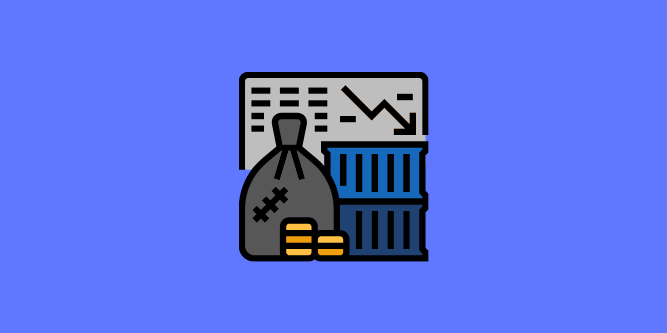During the economic downturn of 2008, it wasn't uncommon for individuals to lose 35 percent or more of their net worth in a matter of months.
Going from a bull to a bear market often comes with these unfortunate losses. Fortunately, there's also a predictability to economic patterns that you can use to your advantage. That is if you understand what the pattern is.
In other words, you don't have to sit back and passively watch everything you've worked so hard for dwindle during the next recession. If you play your cards, right, you can preserve your current affluence or even make money when the next bear decides to show its unruly head.
How to make money in a recession? Keep reading for your definitive guide to coming out ahead.
Your Go-To Plan for Surviving the Next Recession
First of all, let's get your priorities straight. That means being okay with no longer making money during an economic downturn.
In other words, you need to methodically get rid of your risk assets such as real estate and stocks. The longer we exist in a recession cycle, the less you'll want these "assets." So, sell them off when the economy starts to show signs of serious lag.
Yes, you may miss out on some gains. At the same time, however, you'll also avoid losing money. Find out more about the fundamentals of investing.
Learn From the Past
How do you know where we're at in a current cycle? By learning from the past.
Bull markets typically last for about eight years (97 months) each, and they gain an average of 400 points in the S&Ps 500 stock index.
As for bear markets? Statistically, they last for approximately 1.5 years (18 months) and see an average loss of 40 percent.
Based on these observations, you can always figure out where we're at in a current cycle as long as you know when the last recession hit. You see, the cyclical nature of the economy follows a surprisingly consistent pattern, so you'd be remiss not to keep this in mind moving forward.
Always think about where you're at in a current cycle based on your understanding of the past. You can use data available at the National Bureau of Economic Research to help you do this. There, you can access information going back to 1854 to build your cyclical model.
How to Handle Cycle Downturns
Now, you understand that recessions can be predicted based on the cycle of bull and bear markets. That said, how do you stay afloat while tough economic times play out? Let alone make money?
Start by moving mostly to CDs and cash. Or, have short positions that outweigh your long ones at the very end of the cycle.
Even if you move 100 percent to CDs or cash, remember that you're still going to make a guaranteed ~1.75 percent annually based on the risk-free rate for today.
Questions to Ask Yourself
How do you know which financial move is right for you in the current situation? By weighing your guaranteed return against the possibility of losing money or missing out on further gains.
For example, let's say you already boast a 200 percent return in the stock market. Does it make sense to risk a 10 to 15 percent a year loss on a risky deal that'll only yield you eight percent at best?
We think you'll agree a more conservative 1.8 percent a year gain makes sense. This approach represents a way to weather an economic downturn.
As for your real estate investments, here's what you'll need to consider. Let's say your property equity is currently holding at 450 percent.
Is it worth three more years of a mortgage, property tax, and maintenance expenses if the prices remain stagnant? Or, worse, they drop by 19 percent? If it's your dream home, the answer might be yes. If it's a rental property that brings in inconsistent income, the answer is more likely no.
Even after a recession comes to an end, don't expect the stock market or real estate world to rebound overnight. You've got to plan ahead and make adjustments based on your tolerance level when it comes to the longer-term effects of a recession.
Let's Talk Risk and Going Net Short
At this point, you might be wondering why all of the conservative advice when it comes to how to approach investments during a recession? Isn't risk the only way to make a lot of money in a downturn? Not necessarily.
Remember, not all risk is created equal. What you ultimately want to go for are calculated risks.
The easiest way to take a calculated risk over the short-term? By buying an exchange-traded fund (ETF).
An ETF represents a basket of securities, including bonds, stocks, commodities, or some combination thereof. They come with the diversification benefits of mutual funds while offering the ease of trade seen with stocks.
The fantastic thing about ETFs? You can either use them short-term to juice your returns or long-term to blow things up under the right circumstances. Of course, this will require staying proactive when it comes to monitoring economic trends.
That said, buyer beware! If you short a high-dividend yielding sector, treasury bond, or stock ETF, you will have to pay the dividend.
What About Other Options?
Some people have seen tremendous success through investment in low-priced microcap stocks. You can even invest your spare change with apps such as Acorns and enjoy significant results.
Others swear by mega capitalization companies that are cash-rich and have a significant history of paying a dividend. Safe bets include Proctor & Gamble and AT&T.
You don't have to stop there, though. Look for brands in the utility or consumer staples space that meet the requirements mentioned above. Not only do they have a proven track record, but they've got the cash to ride out the current situation.
Ready for more information about investing with confidence as well as a heads up on market-beating stocks? Check this out.
Seek Safety in U.S. Treasuries
Historically, when the world's in chaos, investors seek out the safety of U.S. Treasury bonds. The most common and popular ETF to buy? TLT (iShares 20+ Year Treasuries).
How did TLT perform during the last recession? It spiked from $92.83 on October 1, 2008, to $119.35 on December 1, 2008. That's an increase of +28.6 percent, and it occurred during the depths of the financial crisis.
Since 2008, there have been several trading opportunities of 20 percent or more. A variety of different factors were involved in each one, from policy risk to geopolitical risk, and further market sell-offs.
Here's the takeaway. Even if you had bought TLT at its 2008 high, you'd still be back to even today while earning a steady ~3 percent annual yield.
As of the fourth quarter of 2019? The bond market witnessed a huge run with TLT, year-to-date outperforming the S&P 500. It's time to stop avoiding bonds and start taking a look at the benefits associated with their lower risk returns.
Go for the Gold
As a hard asset, gold also generally does well during economic downturns. While it generates no dividends or earnings, it's a commodity that can be traded.
In dire situations, hard assets always gain in value. Even if you're betting on a more prolonged recession than what we suggest, gold will remain an investment you should carefully consider.
The two most popular gold ETF are GLD and IAU. How did they perform during the recession of 2008?
On October 1, 2008, GLD performed very strongly, launching an upward trend through early 2012 of 170+ percent. It faded, however, as the bull market took over. So, you need to know when to keep and sell this hard asset.
As for long-term investments in gold, you must have a thorough understanding of global supply and demand dynamics. You must also understand that gold is denominated in U.S. dollars. With these caveats in mind, gold remains a reliable hedge under the right circumstances.
Let's Talk Stock Volatility
Some investors prefer to go long volatility by buying a volatility ETF like VXX. Depending on the circumstances, this strategy can sometimes make sense. For example, in early 2018, VXX doubled from $25.68 to $50.
In August 2019, the same thing happened. Just remember that going long volatility for the duration is a losing proposition. Why? Because of a little thing called decay.
Back on August 1, 2013, VXX came in at $1,090. Just five years later, it came in at only $33. That's a 97 percent loss. Yikes!
What's the moral when it comes to volatility? While you can go long volatility for a short period of time (less than two months), anything beyond that threatens to drag you down financially.
Invest in Yourself
When it comes to how to make money during a recession, you also need to keep in mind investing in yourself and cultivating your value. When recessions happen, the people who don't lose their jobs are the ones that prove most valuable to their firms.
In other words, you need to make sure you've got the skills necessary to survive and thrive even during the toughest economic moments. Take time to assess your current situation and your professional strengths and weaknesses.
What skills, internal goodwill, and client relationships do you need to build to stay employed forever? Once you've determined what those are, pursue the experiences and educational programs necessary to cultivate those characteristics. You may need to go back to school or attend a new networking event or professional development conference.
Investing in yourself will prove worth it in the long run, however. You are likely your most important and biggest money-maker.
Besides investing in educational and professional experiences, set aside time each week to pursue your passions. We can't tell you how many times we've heard from individuals making a stable income from a hobby or side gig.
Do you long to write songs or create a website that earns advertising revenue? Then, what are you waiting for? Whether you end up earning royalties on songs or a nice paycheck each month from affiliate marketing, these represent additional ways to make money during a recession.
How to Make Money in a Recession
As you can see, you've got plenty of options when it comes to hedging and even making money during a downturn. Some of the possibilities prove highly proactive, like investing in ETFs, bonds, or professional development.
Besides these more active ways of how to profit from a recession, you should also re-evaluate your current investments and find ways to reduce loss. Even if that means aiming for more conservative earnings.
Keep in mind, however, that shorting the market long-term is a losing proposition. Why? Because of ever-growing demand, population growth, dwindling supply, and inflation.
Think of it like renting a home versus buying one. While renting might make sense over the short-term, extending it out for years or even decades isn't financially viable. You're just throwing away money after a certain point.
Investing During a Recession
How to make money in a recession? If you want to short the market, you must remain highly disciplined and act quickly. You might only have a week if you're buying volatility. Or less than two years if you're shorting the S&P 500.
Either way, you're likely to lose money as your time will prove imprecise. For these reasons and more, many investors looking to hedge against a recession build a diverse portfolio of both longs and shorts. They also rebalance their net exposure whenever they feel the cycle shifting from bullish to bearish.
Are you interested in more financial information? Check out our list of the top ten personal finance blogs for young adults.



